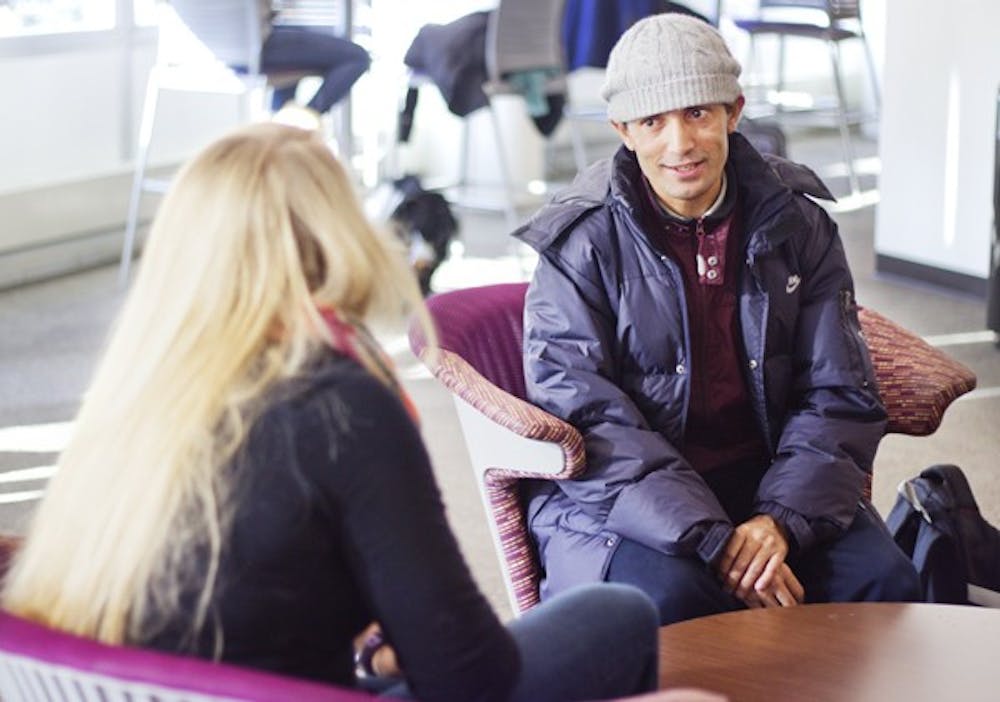Conversation partners program promotes diversity, teaches culture

Leaving behind three children, a wife, parents and siblings, graduate student Khila Pokharel moved from Nepal to Mount Pleasant to receive a better education.
Pokharel is an English Language Institute student who aspires to improve his English-speaking skills to become a better English teacher in Nepal.
“I first learned English in Nepal and also used to teach it in Nepal,” he said. “I wanted to become a better English teacher and learn all that I can.”
In order for international students to become well-rounded English speakers, ELI offers the Conversation Partner Program, which partners ELI students with American volunteers.
Conversation Partner Program Coordinator Caitlin Hamstra said the main focus is to promote diversity on campus.
“A conversation partnership is a proficient English speaker paired with an international student to converse in informal English learning, slang, idioms, culture, navigation skills and more,” she said. “(International students) are already being prepared for academic English-speaking, so conversation partners are a supplement for that. Instead, they are being taught informal language usage. This also gives American students a chance to learn about the different cultures.”
With more than 200 individuals participating, sometimes the international/native student ratio gets unbalanced. There are currently more international students than American volunteers, resulting in groups of students to each volunteer.
Hamstra believes many students are unaware of the program or are too busy to volunteer, but encourages everyone to volunteer and register online if interested.
“You get the chance to learn about a new culture and different lifestyles and altogether a different way to look at the world,” Hamstra said. “You are expanding your horizons and expanding your friendships.”
Each pair is required to meet for one hour every week. Pokharel meets with his partner, Greenville freshman Alexandra Wagner, typically for coffee or lunch.
“I heard about conversations partners through the Honors Program, and I was really interested,” she said. “I always see a lot of international students around, and I thought it would be a great way to connect with them.”
Wagner and Pokharel meet every Friday for at least one hour, but oftentimes, their talks last longer.
“I love it,” Wagner said. "There aren’t any negatives. It is a great way to learn about different cultures, and if students are working on languages, it definitely helps. In a way, it widens your perspective. There is a lot more to it than just putting it on your resume, it is something that sticks with you.”
Culture has become the main focus for the pair. Their conversations usually revolving around comparing and contrasting the way of life in both countries.
Pokharel said he misses the culture of Nepal and his family, friends and relationships. With American holidays, such as Thanksgiving approaching, living without family is difficult.
Wagner recently informed Pokharel about Thanksgiving traditions, including Black Friday.
“It is always nice to teach them about our culture and hear their reactions,” she said. “I, hopefully, will be able to take them to just one Thursday night store, so they can experience a Black Friday sale. If it works out with my family, I would love to have them over for Thanksgiving, too.”
While Pokharel does not plan to visit Nepal until he is done with graduate school in about two years, he said he is mentally prepared for the transition and is just trying to enjoy all his time in America and to learn as much as possible.
“A conversation partner lets me talk about culture, student life, practice my English and get my questions answered," Pokharel said. "I can talk English and about school to anybody on this campus, but not culture. This is a way to talk culture and to learn even more than the language"



